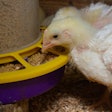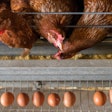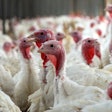
The cause of the broiler muscle myopathy referred to as woody breast has not been identified yet, but researchers are busy looking for clues. Dr. Michael Kogut, lead scientist and microbiologist, USDA Agricultural Research Service Laboratory, College Station, Texas, offered the hypothesis that a dysbiosis, microbial imbalance, in a broiler’s digestive tract is one of the causes of woody breast.
“It’s a hypothesis based on results during the development of woody breast (that) there is an issue at the gut level,” Kogut told the audience at the DSM Nutritional Products Breakfast Meeting on January 30, 2018. “It’s one of the components. It’s not the sole reason, but there is a dysbiosis occurring at the gut usually due to overfeeding. There’s an excess of nutrients and that is resulting in a chronic inflammatory response which has systemic types of effects. You affect the gut, you affect the muscle. We have data on that,” he said.
Kogut said that this data hasn’t been published yet, but he pointed out another example of dysbiosis negatively impacting muscle tissues. “Even if you have a Salmonella infection, you effect the muscle leading to a lot of fat deposition,” he said.
Moving away from ad libitum feeding of a nutrient-dense diet to a restricted feeding program was suggested by Kogut as a potential measure for preventing the development of woody breast. He said that an excess of nutrients in the gut, either nutrient metabolites or nutrients that are indigestible by the bird, can trigger dysbiosis in the gut. Preventing the dysbiosis from developing in the bird’s gut might also prevent the onset of woody breast, according to Kogut. He stressed that this was still just a hypothesis, but one that is suggested by the data his lab has collected.
If broilers are raised on restricted diet — either in quantity of feed or nutrient density of the feed — from placement on the farm, Kogut said that the feed restriction shouldn’t trigger dysbiosis.
















